- Home
- Michael Ondaatje
The English Patient Page 10
The English Patient Read online
Page 10
Now, hours later, Kip sits once again in the window alcove. If he could walk the seven yards across the Englishman’s room and touch her he would be sane. There was so little light in the room, just the candle at the table where she sat, not reading tonight; he thought perhaps she was slightly drunk.
He had returned from the source of the mine explosion to find Caravaggio asleep on the library sofa with the dog in his arms. The hound watched him as he paused at the open door, moving as little of its body as it had to, to acknowledge it was awake and guarding the place. Its quiet growl rising above Caravaggio’s snore.
He took off his boots, tied the laces together and slung them over his shoulder as he went upstairs. It had started to rain and he needed a tarpaulin for his tent. From the hall he saw the light still on in the English patient’s room.
She sat in the chair, one elbow on the table where the low candle sprayed its light, her head leaning back. He lowered his boots to the floor and came silently into the room, where the party had been going on three hours earlier. He could smell alcohol in the air. She put her fingers to her lips as he entered and then pointed to the patient. He wouldn’t hear Kip’s silent walk. The sapper sat in the well of the window again. If he could walk across the room and touch her he would be sane. But between them lay a treacherous and complex journey. It was a very wide world. And the Englishman woke at any sound, the hearing aid turned to full level when he slept, so he could be secure in his own awareness. The girl’s eyes darted around and then were still when she faced Kip in the rectangle of window.
He had found the location of the death and what was left there and they had buried his second-in-command, Hardy. And afterwards he kept thinking of the girl that afternoon, suddenly terrified for her, angry at her for involving herself. She had tried to damage her life so casually. She stared. Her last communication had been the finger to her lips. He leaned over and wiped the side of his cheek against the lanyard on his shoulder.
He had walked back through the village, rain falling into pollarded trees of the town square untrimmed since the start of the war, past the strange statue of two men shaking hands on horseback. And now he was here, the candlelight swaying, altering her look so he could not tell what she thought. Wisdom or sadness or curiosity.
If she had been reading or if she had been bending over the Englishman, he would have nodded to her and probably left, but he is now watching Hana as someone young and alone. Tonight, gazing at the scene of the mine blast, he had begun to fear her presence during the afternoon dismantling. He had to remove it, or she would be with him each time he approached a fuze. He would be pregnant with her. When he worked, clarity and music filled him, the human world extinguished. Now she was within him or on his shoulder, the way he had once seen a live goat being carried by an officer out of a tunnel they were attempting to flood.
No.
That wasn’t true. He wanted Hana’s shoulder, wanted to place his palm over it as he had done in the sunlight when she slept and he had lain there as if in someone’s rifle sights, awkward with her. Within the imaginary painter’s landscape. He did not want comfort but he wanted to surround the girl with it, to guide her from this room. He refused to believe in his own weaknesses, and with her he had not found a weakness to fit himself against. Neither of them was willing to reveal such a possibility to the other. Hana sat so still. She looked at him, and the candle wavered and altered her look. He was unaware that for her he was just a silhouette, his slight body and his skin part of the darkness.
Earlier, when she saw that he had left the window alcove, she had been enraged. Knowing that he was protecting them like children from the mine. She had clung closer to Caravaggio. It had been an insult. And tonight the growing exhilaration of the evening didn’t permit her to read after Caravaggio had gone to bed, stopping to rifle through her medicine box first, and after the English patient had plucked at the air with his bony finger and, when she had bent over, kissed her cheek.
She had blown out the other candles, lit just the night stub at the bedside table and sat there, the Englishman’s body facing her in silence after the wildness of his drunken speeches. ‘Sometime a horse I’ll be, sometime a hound. A hog, a headless bear, sometime afire.’ She could hear the spill of the wax into the metal tray beside her. The sapper had gone through town to some reach of the hill where the explosion had taken place, and his unnecessary silence still angered her.
She could not read. She sat in the room with her eternally dying man, the small of her back still feeling bruised from an accidental slam against the wall during her dance with Caravaggio.
Now if he moves towards her she will stare him out, will treat him to a similar silence. Let him guess, make a move. She has been approached before by soldiers.
But what he does is this. He is halfway across the room, his hand sunk to the wrist in his open satchel which still hangs off his shoulder. His walk silent. He turns and pauses beside the bed. As the English patient completes one of his long exhalations he snips the wire of his hearing aid with the cutters and drops them back into the satchel. He turns and grins towards her.
‘I’ll rewire him in the morning.’
He puts his left hand on her shoulder.
‘David Caravaggio – an absurd name for you, of course …’
‘At least I have a name.’
‘Yes.’
Caravaggio sits in Hana’s chair. Afternoon sun fills the room, revealing the swimming motes. The Englishman’s dark lean face with its angular nose has the appearance of a still hawk swaddled in sheets. The coffin of a hawk, Caravaggio thinks.
The Englishman turns to him.
‘There’s a painting by Caravaggio, done late in his life. David with the Head of Goliath. In it, the young warrior holds at the end of his outstretched arm the head of Goliath, ravaged and old. But that is not the true sadness in the picture. It is assumed that the face of David is a portrait of the youthful Caravaggio and the head of Goliath is a portrait of him as an older man, how he looked when he did the painting. Youth judging age at the end of its outstretched hand. The judging of one’s own mortality. I think when I see him at the foot of my bed that Kip is my David.’
Caravaggio sits there in silence, thoughts lost among the floating motes. War has unbalanced him and he can return to no other world as he is, wearing these false limbs that morphine promises. He is a man in middle age who has never become accustomed to families. All his life he has avoided permanent intimacy. Till this war he has been a better lover than husband. He has been a man who slips away, in the way lovers leave chaos, the way thieves leave reduced houses.
He watches the man in the bed. He needs to know who this Englishman from the desert is, and reveal him for Hana’s sake. Or perhaps invent a skin for him, the way tannic acid camouflages a burned man’s rawness.
Working in Cairo during the early days of the war, he had been trained to invent double agents or phantoms who would take on flesh. He had been in charge of a mythical agent named ‘Cheese,’ and he spent weeks clothing him with facts, giving him qualities of character – such as greed and a weakness for drink when he would spill false rumours to the enemy. Just as some in Cairo he worked for invented whole platoons in the desert. He had lived through a time of war when everything offered up to those around him was a lie. He had felt like a man in the darkness of a room imitating the calls of a bird.
But here they were shedding skins. They could imitate nothing but what they were. There was no defence but to look for the truth in others.
She pulls down the copy of Kim from the library shelf and, standing against the piano, begins to write into the flyleaf in its last pages.
He says the gun – the Zam-Zammah cannon – is still there outside the museum in Lahore. There were two guns, made up of metal cups and bowls taken from every Hindu household in the city – as jizya, or tax. These were melted down and made into the guns. They were used in many battles in the eighteenth and nineteenth centuries against Sikhs.
The other gun was lost during a battle crossing in the Chenab River –
She closes the book, climbs onto a chair and nestles the book into the high, invisible shelf.
She enters the painted bedroom with a new book and announces the title.
‘No books now, Hana.’
She looks at him. He has, even now, she thinks, beautiful eyes. Everything occurs there, in that grey stare out of his darkness. There is a sense of numerous gazes that flicker onto her for a moment, then shift away like a lighthouse.
‘No more books. Just give me the Herodotus.’
She puts the thick, soiled book into his hands.
‘I have seen editions of The Histories with a sculpted portrait on the cover. Some statue found in a French museum. But I never imagine Herodotus this way. I see him more as one of those spare men of the desert who travel from oasis to oasis, trading legends as if it is the exchange of seeds, consuming everything without suspicion, piecing together a mirage. ‘This history of mine,’ Herodotus says, ‘has from the beginning sought out the supplementary to the main argument.’ What you find in him are cul-de-sacs within the sweep of history – how people betray each other for the sake of nations, how people fall in love … How old did you say you were?’
‘Twenty.’
‘I was much older when I fell in love.’
Hana pauses. ‘Who was she?’
But his eyes are away from her now.
‘Birds prefer trees with dead branches,’ said Caravaggio. ‘They have complete vistas from where they perch. They can take off in any direction.’
‘If you are talking about me,’ Hana said, ‘I’m not a bird. The real bird is the man upstairs.’
Kip tried to imagine her as a bird.
‘Tell me, is it possible to love someone who is not as smart as you are?’ Caravaggio, in a belligerent morphine rush, wanted the mood of argument. ‘This is something that has concerned me most of my sexual life – which began late, I must announce to this select company. In the same way the sexual pleasure of conversation came to me only after I was married. I had never thought words erotic. Sometimes I really do like to talk more than fuck. Sentences. Buckets of this buckets of that and then buckets of this again. The trouble with words is that you can really talk yourself into a corner. Whereas you can’t fuck yourself into a corner.’
‘That’s a man talking,’ muttered Hana.
‘Well, I haven’t,’ Caravaggio continued, ‘maybe you have, Kip, when you came down to Bombay from the hills, when you came to England for military training. Has anyone, I wonder, fucked themselves into a corner. How old are you, Kip?’
‘Twenty-six.’
‘Older than I am.’
‘Older than Hana. Could you fall in love with her if she wasn’t smarter than you? I mean, she may not be smarter than you. But isn’t it important for you to think she is smarter than you in order to fall in love? Think now. She can be obsessed by the Englishman because he knows more. We’re in a huge field when we talk to that guy. We don’t even know if he’s English. He’s probably not. You see, I think it is easier to fall in love with him than with you. Why is that? Because we want to know things, how the pieces fit. Talkers seduce, words direct us into corners. We want more than anything to grow and change. Brave new world.’
‘I don’t think so,’ said Hana.
‘Neither do I. Let me tell you about people my age. The worst thing is others assume you have developed your character by now. The trouble with middle age is they think you are fully formed. Here.’
Here Caravaggio lifted up his hands, so they faced Hana and Kip. She got up and went behind him and put her arm around his neck.
‘Don’t do this, okay, David?’
She wrapped her hands softly around his.
‘We’ve already got one crazy talker upstairs.’
‘Look at us – we sit here like the filthy rich in their filthy villas up in the filthy hills when the city gets too hot. It’s nine in the morning – the old guy upstairs is asleep. Hana’s obsessed with him. I am obsessed with the sanity of Hana, I’m obsessed with my “balance,” and Kip will probably get blown up one of these days. Why? For whose sake? He’s twenty-six years old. The British army teaches him the skills and the Americans teach him further skills and the team of sappers are given lectures, are decorated and sent off into the rich hills. You are being used, boyo, as the Welsh say. I’m not staying here much longer. I want to take you home. Get the hell out of Dodge City.’
‘Stop it, David. He’ll survive.’
‘The sapper who got blown up the other night, what was his name?’
Nothing from Kip.
‘What was his name?’
‘Sam Hardy.’ Kip went to the window and looked out, leaving their conversation.
‘The trouble with all of us is we are where we shouldn’t be. What are we doing in Africa, in Italy? What is Kip doing dismantling bombs in orchards, for God’s sake? What is he doing fighting English wars? A farmer on the western front cannot prune a tree without ruining his saw. Why? Because of the amount of shrapnel shot into it during the last war. Even the trees are thick with diseases we brought. The armies indoctrinate you and leave you here and they fuck off somewhere else to cause trouble, inky-dinky parlez-vous. We should all move out together.’
‘We can’t leave the Englishman.’
‘The Englishman left months ago, Hana, he’s with the Bedouin or in some English garden with its phlox and shit. He probably can’t even remember the woman he’s circling around, trying to talk about. He doesn’t know where the fuck he is.
‘You think I’m angry at you, don’t you? Because you have fallen in love. Don’t you? A jealous uncle. I’m terrified for you. I want to kill the Englishman, because that is the only thing that will save you, get you out of here. And I am beginning to like him. Desert your post. How can Kip love you if you are not smart enough to make him stop risking his life?’
‘Because. Because he believes in a civilised world. He’s a civilised man.’
‘First mistake. The correct move is to get on a train, go and have babies together. Shall we go and ask the Englishman, the bird, what he thinks?
‘Why are you not smarter? It’s only the rich who can’t afford to be smart. They’re compromised. They got locked years ago into privilege. They have to protect their belongings. No one is meaner than the rich. Trust me. But they have to follow the rules of their shitty civilised world. They declare war, they have honour, and they can’t leave. But you two. We three. We’re free. How many sappers die? Why aren’t you dead yet? Be irresponsible. Luck runs out.’
Hana was pouring milk into her cup. As she finished she moved the lip of the jug over Kip’s hand and continued pouring the milk over his brown hand and up his arm to his elbow and then stopped. He didn’t move it away.
There are two levels of long, narrow garden to the west of the house. A formal terrace and, higher up, the darker garden, where stone steps and concrete statues almost disappear under the green mildew of the rains. The sapper has his tent pitched here. Rain falls and mist rises out of the valley, and the other rain from the branches of cypress and fir falls upon this half-cleared pocket on the side of the hill.
Only bonfires can dry the permanently wet and shadowed upper garden. The refuse of planks, rafters from prior shellings, dragged branches, weeds pulled up by Hana during the afternoons, scythed grass and nettles – all are brought here and burned by them during the late afternoon’s pivot into dusk. The damp fires steam and burn, and the plant-odoured smoke sidles into the bushes, up into the trees, then withers on the terrace in front of the house. It reaches the window of the English patient, who can hear the drift of voices, now and then a laugh from the smoky garden. He translates the smell, evolving it backwards to what had been burned. Rosemary, he thinks, milkweed, wormwood, something else is also there, scentless, perhaps the dog violet, or the false sunflower, which loves the slightly acidic soil of this hill.
The English
patient advises Hana on what to grow. ‘Get your Italian friend to find seeds for you, he seems capable in that category. What you want are plum leaves. Also fire pink and Indian pink – if you want the Latin name for your Latin friend, it is Silene virginica. Red savory is good. If you want finches get hazel and chokecherries.’
She writes everything down. Then puts the fountain pen into the drawer of the small table where she keeps the book she is reading to him, along with two candles, Vesta matches. There are no medical supplies in this room. She hides them in other rooms. If Caravaggio is to hunt them out, she doesn’t want him disturbing the Englishman. She puts the slip of paper with the names of plants into the pocket of her dress to give to Caravaggio. Now that physical attraction has raised its head, she has begun to feel awkward in the company of the three men.
If it is physical attraction. If all this has to do with love of Kip. She likes to lay her face against the upper reaches of his arm, that dark brown river, and to wake submerged within it, against the pulse of an unseen vein in his flesh beside her. The vein she would have to locate and insert a saline solution into if he were dying.
At two or three in the morning, after leaving the Englishman, she walks through the garden towards the sapper’s hurricane lamp, which hangs off the arm of St. Christopher. Absolute darkness between her and the light, but she knows every shrub and bush in her path, the location of the bonfire she passes, low and pink in its near completion. Sometimes she cups a hand over the glass funnel and blows out the flame, and sometimes she leaves it burning and ducks under it and enters through the open flaps, to crawl in against his body, the arm she wants, her tongue instead of a swab, her tooth instead of a needle, her mouth instead of the mask with the codeine drops to make him sleep, to make his immortal ticking brain slow into sleepiness. She folds her paisley dress and places it on top of her tennis shoes. She knows that for him the world burns around them with only a few crucial rules. You replace TNT with steam, you drain it, you – all this she knows is in his head as she sleeps beside him virtuous as a sister.

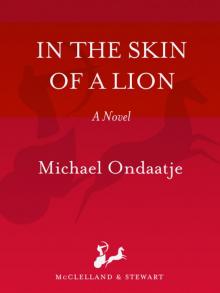 In the Skin of a Lion
In the Skin of a Lion The Cinnamon Peeler
The Cinnamon Peeler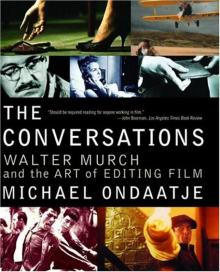 The Conversations: Walter Murch and the Art of Editing Film
The Conversations: Walter Murch and the Art of Editing Film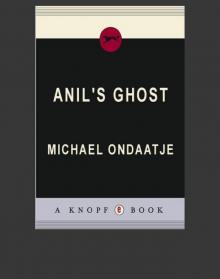 Anil's Ghost
Anil's Ghost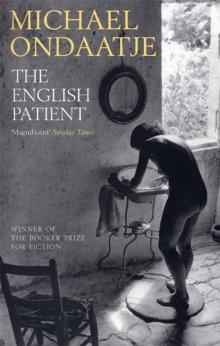 The English Patient
The English Patient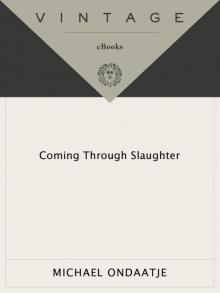 Coming Through Slaughter
Coming Through Slaughter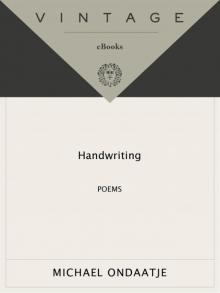 Handwriting
Handwriting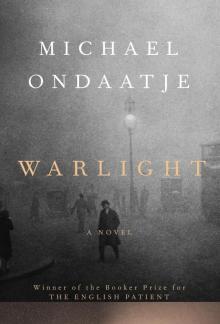 Warlight
Warlight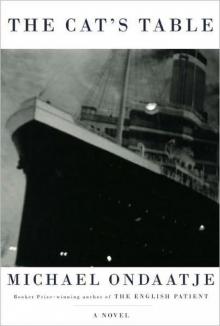 The Cat's Table
The Cat's Table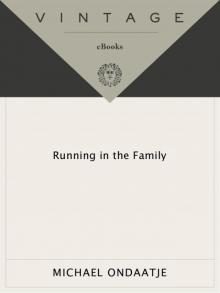 Running in the Family
Running in the Family The Collected Works of Billy the Kid
The Collected Works of Billy the Kid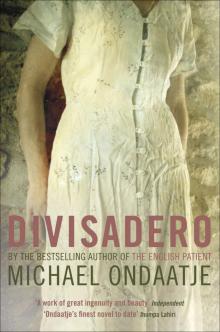 Divisadero
Divisadero